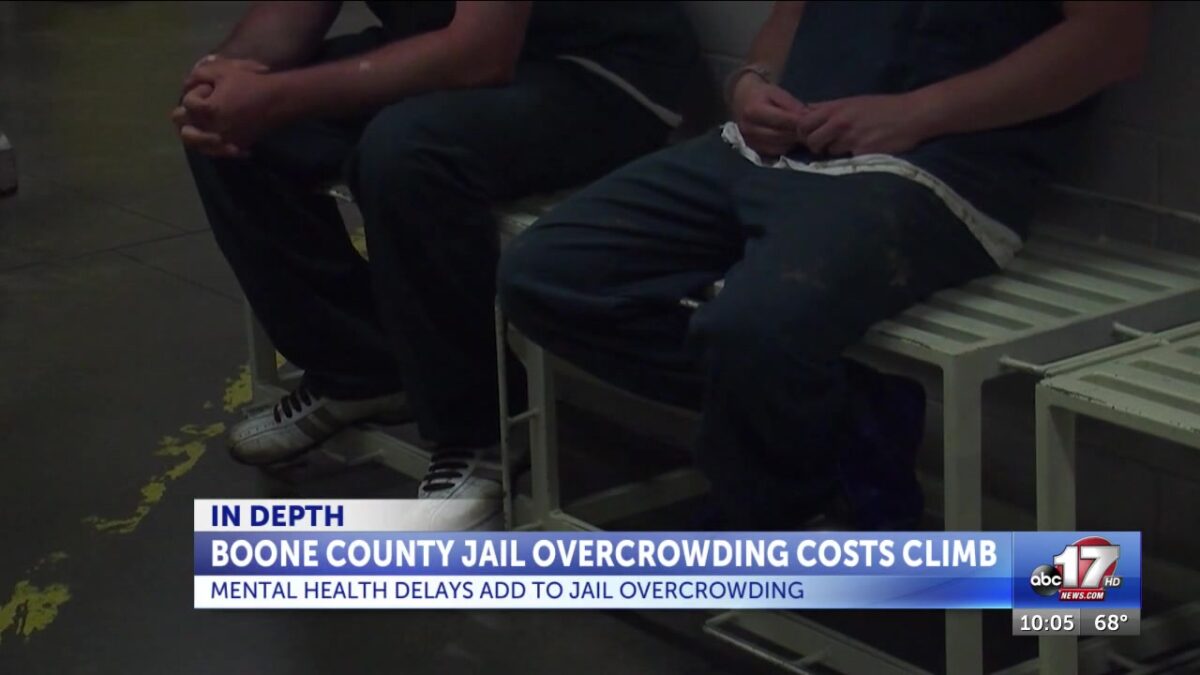Boone County Jail overcrowding costs climb amid Department of Mental Health backlog

Mitchell Kaminski
COLUMBIA, Mo. (KMIZ)
Boone County is spending hundreds of thousands of dollars to house inmates in jails across Mid-Missouri, as local officials continue to struggle with overcrowding and a growing backlog of detainees awaiting mental health evaluations.
From Jan.-10May 23, the county had spent $461,235 to house detainees in other counties, according to Capt. Brian Leer of the Boone County Sheriff’s Office.
“Currently, we are paying to house 113 detainees in other county jails,” Leer told ABC 17 in an email on May 22.
As of June 6, the Sheriff’s Office is paying to house 111 detainees in other county jails, with detainees held in facilities in Callaway, Cooper, Howard, Macon, Miller, Montgomery and Randolph counties.
However, not all detainees classified as “out of county” are housed in jail beds funded by Boone County. Some are held by U.S. Marshals or in hospitals, juvenile centers or mental health facilities. Defense attorneys say the dispersal of detainees is making it harder to represent clients effectively.
“I’ve got clients in Randolph County and I’ve got clients in Miller County,” Columbia defense attorney Ben Faber said. “So we got guys an hour north, we got guys an hour south. If I set aside a day to meet with clients, that’s a lot of windshield time just to do my job.”
Faber said the system is overburdened, and the strain extends beyond attorneys.
“It’s just creating more work and less office time, which means that cases are not being handled as quickly as you want them to,” Faber said. “I call it a gridlock situation sometimes.”
Faber added that limited visiting hours at some rural jails — such as Randolph County’s 4 p.m. closure — make it harder to meet clients face to face.
One of the biggest drivers of overcrowding, according to Boone County Commissioner Janet Thompson, is the bottleneck at the Missouri Department of Mental Health.
Thompson said the Department of Mental Health has not removed individuals from the county jail when their competency to proceed is in question. When someone’s competency is challenged, a defense attorney, judge or prosecutor can request a mental health evaluation to determine whether the individual is competent to stand trial.
“What’s happened in our jail and in jails across Missouri is that process has happened and then they have been adjudicated incompetent to proceed, and at that point the Department of Mental Health does not take them,” Thompson said. “Instead, we have over 400 people across the state of Missouri who are sitting in county jails waiting for a bed at DMH. That’s part of the problem that we have and one of the things that’s impacting our jail overcrowding.”
Leer confirmed that “at least 10 individuals” in the Boone County Jail are currently awaiting transfer to the Department of Mental Health.
Defendants with serious mental health issues must be housed alone, further limiting available space.
“When we have somebody who has serious mental health issues, we cannot double-bunk them. You can’t have somebody else in there with them. It’s a safety issue,” Thompson said.
Boone County holds quarterly jail overcrowding meetings that include the presiding judge, court administrators, representatives from Adult Services and circuit courts, the sheriff’s office, a county commissioner and the auditor. The group discusses strategies for managing limited jail space and rising costs.
Despite these efforts, the financial burden continues to climb.
“Looking at past usage and trying to anticipate what we’re going to need for every year, we have blown through that amount every year since I’ve been on the commission,” Thompson said.
When the county exceeds its budget, it’s forced to tap into its general fund.
Faber, who echoed Thompson’s concerns on the Department of Mental Health backlog, said the problem reflects broader dysfunction in Missouri’s criminal justice and mental health systems.
“It’s a systemic problem. It probably starts with crime. But the system doesn’t appear to be able to handle the numbers that it has right now. And we’re not seeing adaptations to make actual systemic changes,” Faber said. “What we’re seeing is just sort of Band-Aids and short-term fixes.”